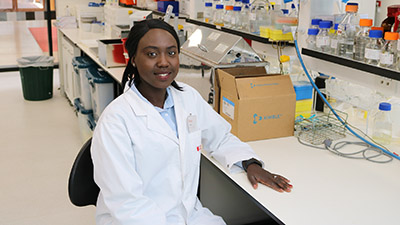Sorghum focus for new PhD student
 In Australia sorghum is something we think more about feeding to animals than eating ourselves but the potential health benefits from compounds in this grain is the focus of new PhD research at the Functional Grains Centre.
In Australia sorghum is something we think more about feeding to animals than eating ourselves but the potential health benefits from compounds in this grain is the focus of new PhD research at the Functional Grains Centre.
Meet PhD student, Ms Nyadoub Jok who has recently joined the FGC.
I am currently a PhD candidate in the School of Biomedical Sciences with the Functional Grains Centre at Charles Sturt University.
I have a background in pharmaceuticals at CSL-Seqirus where I was involved in producing the Influenza vaccine in 2016. In the same year, I was awarded first class honours, from Swinburne University in affiliation with the Peter MacCallum Cancer Centre where my thesis was titled ‘Establishing Patient Specific Parameters for Radiotherapy of Non-small Cell Lung Cancer’. I also graduated with a Bachelor of Science (Biomedical Science) in 2015 from Swinburne University with Distinction.
What is your PhD studying?
Sorghum has been found to reduce long-term complications such as liver disease and several forms of cancer. My project aims to determine the impact of sorghum-derived polyphenols and protein hydrolysates on pathways of cancer progression and development. I will be examining the protective role that sorghum extracts impart on chronic inflammation, resisting apoptosis, invasion and metastasis, chronic cell cycle replication and sustained angiogenesis. The bioavailability of sorghum varieties will also be explored in order to determine physiologically attainable levels in the body for favourable health benefits.
Why is that important for the grains industry?
In Australia, sorghum is exclusively used for livestock feed. The crop has the ability to withstand harsh climates such as drought and heat. By studying this grain and understanding its health benefits there is the potential to increase human consumption of sorghum. This might support the development of alternative markets and provide more opportunity for sorghum production.
- ARC Industrial Transformation Training Centre for Functional Grains
- News
- Newsletter Archive
- 2020
- Issue 1 2020
- Sorghum focus for new PhD student


